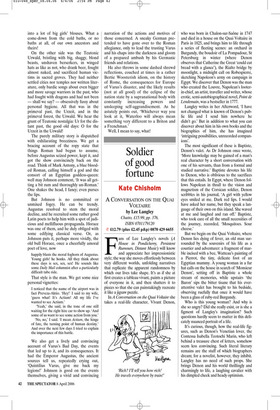Soldier of good fortune
Kate Chisholm
A CONVERSATION ON THE QUAI VOLTAIRE by Lee Langley Chatto, £15.99, pp. 376, ISBN 0701179120 ✆ £12.79 (plus £2.45 p&p) 0870 429 6655 Fans of Lee Langley’s novels (A House in Pondicherry, Persistent Rumours, Distant Music) will know and appreciate her impressionistic style; the way she moves effortlessly between very different worlds, unfolding narratives that replicate the apparent randomness by which our lives take shape. It’s as if she at first creates a tableau vivant, paints a picture of everyone in it, and then shatters it to pieces so that she can painstakingly recreate it like a jigsaw puzzle.
In A Conversation on the Quai Voltaire she takes a real-life character, Vivant Denon, who was born in Chalon-sur-Saline in 1747 and died in a house on the Quai Voltaire in Paris in 1825, and brings him to life through a series of fleeting scenes: an orchard in Burgundy, the boudoir of La Pompadour, St Petersburg in winter (where Denon observes that Catherine the Great ‘could cut bread with a glance’), the Rialto bridge by moonlight, a midnight call on Robespierre, sketching Napoleon’s army on campaign in Egypt. We discover that Denon was the man who created the Louvre, Napolean’s looterin-chief, an artist, traveller and writer, whose erotic, semi-autobiographical novel, Point de Lendemain, was a bestseller in 1777.
Langley writes in her Afterword, ‘I have not changed what is known of Denon’s public life and I send him nowhere he didn’t go.’ But in addition to what you can discover about him in his own books and the biographies of him, she has imagined ‘intriguing possibilities, unrecorded companions’.
The most significant of these is Baptiste, Denon’s valet. As Dr Johnson once wrote, ‘More knowledge may be gained of a man’s real character by a short conversation with one of his servants, than from a formal and studied narrative.’ Baptiste devotes his life to Denon, who is oblivious to the sacrifices that this entails. In Egypt, where Denon follows Napolean in thrall to the vision and magnetism of the Corsican soldier, Denon scribbles in his journal, ‘A girl with yellow eyes smiled at me. Dark red lips. I would have asked her name, but they speak a language of their own on this island. She waved at me and laughed and ran off.’ Baptiste, who took care of all the small necessities of the journey, recorded, ‘Mosquitoes. Sour cheese.’ But we begin on the Quai Voltaire, where Denon lies dying of fever, an old man surrounded by the souvenirs of his life as a courtier and adventurer: a fragment of marble incised with a bee, Watteau’s painting of a Pierrot, the tiny, delicate foot of an Egyptian mummy. A young woman in a fur hat calls on the house in search of ‘Monsieur Denon’, setting off in Baptiste a whole stream of memories, while upstairs ‘the Baron’ sips the bitter tisane that his everattentive valet has brought to his bedside, observing ruefully that once it would have been a glass of ruby-red Burgundy.
Who is this young woman? And why is she so angry? Did she really exist, or is she a figment of Langley’s imagination? Such questions hardly seem to matter in this delicately nuanced portrait of a life.
It’s curious, though, how the real-life figures, such as Denon’s Venetian lover, the Contessa Isabella Teotochi Marin, who left behind a treasure chest of letters, somehow seem less convincing. Such literal literary remains are the stuff of which biographers dream; for a novelist, however, they inhibit. Langley has no need of such props. She brings Denon and his world thrillingly and charmingly to life, a laughing cavalier with his dimpled cheek and heady optimism.










































































 Previous page
Previous page